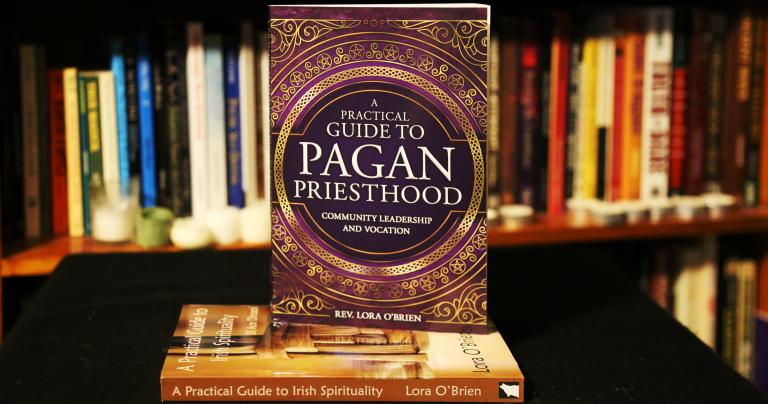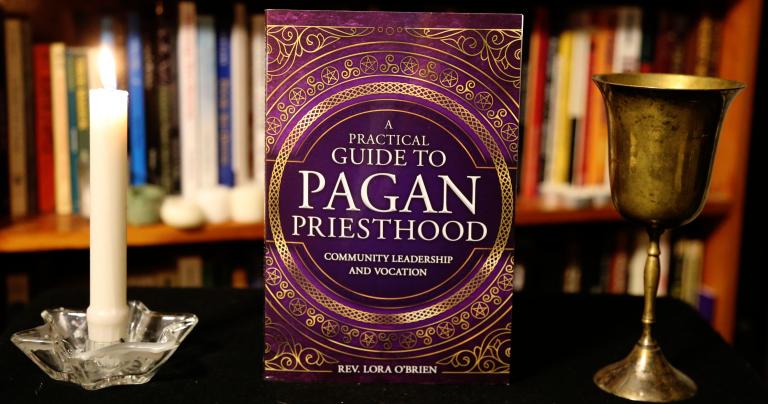A Practical Guide to Pagan Priesthood
by Rev. Lora O’Brien
Llewellyn – October 2019
240 pages
Paperback: $19.99, Kindle: $10.99
There is perhaps no greater controversy in modern Paganism than that of priests and priesthood. Wicca declares that all its initiates are priests or priestesses (gender differences are largely irrelevant to the role as discussed in this book, so I use “priest” almost exclusively). Most polytheist traditions define priesthood much more narrowly, and some have very specific and rigorous requirements. On the other hand, a few traditions and many solitary practitioners believe our movement would be better off with no priests at all.
But when a ritual needs to be led, when people die or when they want to get married, or when they run into a crisis – either spiritual or mundane – they go looking for someone with the training, experience, and willingness to help them.
They want a priest. They may not use that word, but that’s what they want.
From the other side, many of us who find our way into Paganism and show some capacity for leadership suddenly find ourselves being treated like priests. People come to us and expect us to be able to help them, whether we can or not.
And some of us are called or claimed by a deity and told to be Their priest, even though we have only the vaguest idea what that means.
What do you do when you need to become a priest and you don’t know how to do it?
There is now an excellent reference: A Practical Guide to Pagan Priesthood by Rev. Lora O’Brien.
This book mostly avoids the argument of what a Pagan priest should be and instead focuses on what Pagans generally expect their priests and priest-like leaders to do. It divides the material into pastoral duties (caring for a community and its members) and sacerdotal duties (“all the supernatural bits of a religious belief system”).
The pastoral section has segments on group leadership, community leadership, learning and teaching, and crisis care. The sacerdotal section covers devotion, magic, rituals, and a very good chapter on communicating with deities – that chapter alone is worth the price of the book.
At every turn, O’Brien emphasizes that priesthood is a role of service (to the Gods and to the community) and not a role of power or status.
There are many in Neo paganismwho are doing the work of priests, who may or may not want to call themselves such. And there are many who have had the title of “priest” bestowed on them, or self-claimed it, who are doing none of this work.
There are many examples of both good and bad behavior by priests. All of them ring true, from the Pagan “elder” who expected to be treated like the Pope to the “teacher” who admitted she stopped learning when she started teaching.
It’s really important to look at who is acting as if “priest” or the equivalent is a fancy title to flash around and who is acting as if it is a job and a responsibility to fulfill.
Reading Pagan Priesthood will not make you a priest. It will help you figure out if you’re suited for priesthood. And if you accept the call, it will provide you with a pretty inclusive syllabus of skills you need to develop, and guidelines for developing them.
Being ordained as a priest means standing in front of your gods, the community, the world, and even the entire universe and declaring yourself fit and ready for service in whatever way that looks for you. Be ready for what that will bring.
This book is not perfect. I disagree with some of O’Brien’s theology, though not to the extent it would make me challenge her approach to priesthood. And I really wish the book included a survey of priesthood in ancient times and in non-Christian cultures. We base so many of our expectations of Pagan priests on what we see from Catholic priests and Protestant ministers – we need some different role models.
But those are minor complaints. If you are a Pagan priest, feel called to become a priest, or if you rely on the services of those who function as priests, you need to read A Practical Guide to Pagan Priesthood.
I’ll give Lora the last words:
I believe that priests teach with our lives, not just with our educational knowledge or our words – so it is absolutely vital that we teach by modeling best practices and behavior as we walk through our own lives.

For those who care about such things, I bought my copy of A Practical Guide to Pagan Priesthood. I support Lora O’Brien on Patreon because it’s important to have an Irish perspective on modern Paganism, but my only obligation in a review is to the reader. If I didn’t think the book was worth reading, I’d conveniently forget to review it.


















